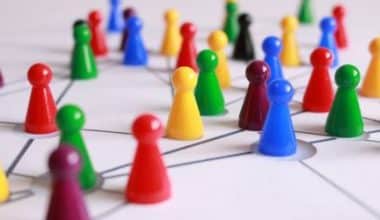One of the most frequently required skills included in job listings by employers is communication skills. You may grow in your profession and stay competitive in the job market by enhancing and showing your communication abilities. Learning about these techniques might also assist you in concentrating on particular aspects of your communication. This article explains the effect of communication skills in the workplace and provides examples of effective communication techniques as well as tips for improving interpersonal skills.
What are Communication Skills?
Communication skills are used when sharing and receiving various types of information. Even though these abilities may be a regular part of your workday, being able to communicate, effectively, and efficiently is a very important and helpful skill. Your efforts to accomplish various personal and professional goals can undoubtedly be aided by actively practicing communication improvement skills over time and learning from effective communicators around you.
Top 10 Effective Communication Skills
The top effective communication skills that recruiters and employers look for in resumes and cover letters, during job interviews, and in career development are listed below:
#1. Active listening
Active listening, also known as appreciative listening or mindful listening, is engaging the person with whom you are speaking by asking them questions and rephrasing your questions. Also, active listening can improve understanding among coworkers and foster a respectful working environment. Avoid distractions like laptops and cell phones when listening actively by concentrating on the speaker.
#2. Choosing the proper channel of communication
It’s crucial to know how to communicate effectively. Communication by email, letter, phone, in-person meeting, or instant message has both pros and downsides. Communication improves when you think about your audience, the information you want to offer, and the best approach to share it.
#3. Friendliness
Friendly qualities like honesty and friendliness can promote trust and understanding when talking at work. Maintain an optimistic outlook while communicating, keep an open mind, and ask questions to better comprehend their perspectives. Asking someone how they’re doing, smiling while they talk, or expressing appreciation for a job well done are all small actions that can help you build positive relationships with coworkers and superiors.
#4. Confidence
People are more receptive to ideas that are presented confidently in the workplace. Making eye contact when speaking to someone, sitting up straight with your shoulders open, and preparing beforehand to ensure that your thoughts are organized and you are prepared to respond to any inquiries are just a few methods to project confidence. Confident communication is beneficial throughout the job interview process as well as on the job. Additionally, refrain from using filler words to project confidence.
#5. Sharing feedback
Sharing specific examples of the problem, describing its effects, and posing questions to help develop solutions are essential components of effective feedback. Strong communicators can both receive and give constructive criticism. Feedback can clarify issues, offer options, or help advance the project or topic at hand. The ability to give and receive feedback at work is crucial since it may both benefit you and those around you who are trying to improve their work and careers.
#6. Tone and volume
Be audible and clear when you speak. Effective communication requires the ability to modify your speaking voice so that it may be heard by others in a range of situations. In some situations, speaking excessively loudly might be impolite or embarrassing. If you’re unsure, observe how people are interacting in the space.
#7. Empathy
Empathy is the capacity to both comprehend and experience other people’s feelings. Both team and one-on-one settings require this communication competence. In both situations, you make an effort to understand and successfully translate other people’s feelings to choose the right reaction.
#8. Respect
Understanding when to speak up and when to answer is a crucial component of respect. Allowing people to talk without interjecting is regarded as an essential communication skill linked to respect in a team or group situation. Respectful communication also entails making the most of the other person’s time by remaining on-topic, posing precise questions, and giving clear answers to any questions they may have.
#9. Nonverbal cues
Nonverbal indicators including body language, facial emotions, and eye contact play some role in communication. You can choose to focus on both what someone is saying and their body language when you are listening to them. It’s crucial to avoid making snap judgments about people based on their body language because, due to cultural or physical variances, not everyone uses the same physical cues.
#10. Responsiveness
Employers frequently perceive quick communicators as more effective than those who take a long time to answer, whether it’s a phone conversation or an email. One strategy is to think about how long it takes you to respond. Can you respond to this inquiry or question within the next five minutes? If so, it could be a good idea to deal with it right away. Even if the request or query is more complicated, you can still acknowledge receipt and let the other person know you’ll respond fully in due course.
Examples of Poor Communication Skills in the Workplace
#1. Delayed communication from leadership
No matter the size of the firm, most employees complain that senior leaders don’t engage with them regularly enough. Employees routinely state that they would prefer to hear from their leaders frequently and early rather than wait until they believe they have all the answers or must handle sensitive topics.
#2. Hybrid or remote workers who are forgotten
Many of the individuals who work in hybrid or entirely remote situations nowadays report feeling increasingly cut off from important communications. Employees frequently request more transparency, specificity, and communication, including routinely planned virtual town halls, Ask Me Anything sessions with executives, regular team meetings, and more.
#3. Lack of accountability after the fact
Leaders who solicit feedback from staff members must follow up with those who provide specific recommendations. Leaders must explain why they can’t act on a specific suggestion, even when they can. Otherwise, workers can believe that their complaints haven’t been taken seriously or that their opinion isn’t respected.
#4. Uncertainty amidst change
Employees turn to leadership to ensure that they receive information about changes in important persons and procedures that may affect their employment and careers. If leaders don’t explain why change is taking place, the rumor mill may start to whirl, further confusing an already complicated situation.
How to Improve Your Effective Communication Skills
You may learn and develop your communication skills with time and effort. Before practicing and developing your strengths, first, determine what they are.
- Observe good communicators around you: Identify people, family members, and friends who consistently express thoughts and information effectively, with respect, empathy, and confidence. Keep track of the precise ways they interact with others by watching and making notes.
- Ask a close friend or coworker for constructive criticism: To receive an unbiased view, ask a person you can trust. You can choose what to focus on by recognizing your communication-related areas of growth.
- Practice improving communication habits: Practice new behaviors that will help you communicate more effectively to improve your communication skills. That could entail being more receptive to communications, remembering to make eye contact, getting practice delivering good comments, and participating in conversations by asking questions.
- Attend workshops or lessons on communication skills: Many online and offline seminars, workshops, and classes can improve your communication skills. Instruction, roleplay, written tasks, and open conversations could all be part of these classes.
- Look for opportunities to communicate: Look for on- and off-the-job occasions where you can put your communication skills to work. This can enable you to practice new talents while simultaneously keeping your current ones fresh.
Effect of Communication Skills
A person’s general well-being, as well as their ability to have successful personal and professional relationships, can be greatly influenced by their ability to communicate effectively. Here are some specific effects of good communication skills:
- Better relationships: Effective communication is essential for building and maintaining healthy relationships. When you communicate well, you can express your thoughts and feelings clearly, listen actively to others, and resolve conflicts constructively.
- Improved work performance: Good communication skills are crucial in the workplace. They help you express your ideas clearly, understand others’ perspectives, and collaborate effectively with your colleagues. Effective communication can also boost your leadership skills and make you a more influential and effective team member.
- Increased confidence: When you can communicate well, you feel more confident in yourself and your abilities. This can help you in various situations, from socializing with new people to delivering presentations at work.
- Reduced stress: Good communication skills can help you express your needs and feelings in a constructive way, which can reduce feelings of frustration and stress. Effective communication can also help you resolve conflicts and prevent misunderstandings, which can contribute to a more peaceful and harmonious life.
- Better mental and emotional health: Poor communication skills can lead to feelings of isolation, anxiety, and depression. On the other hand, good communication skills can help you build strong relationships, healthily express your emotions, and develop a sense of connection with others.
In general, effective communication is crucial for success and happiness in various aspects of life. You may enhance your relationships, professional performance, and general well-being by learning and using effective communication skills.
Interpersonal Communication Skills
The ability to communicate verbally or nonverbally with two or more individuals involves interpersonal communication skills. Hearing, seeing, and feeling body language, facial expressions, and gestures are frequently used in face-to-face communication.
Interpersonal communication, in other words, is the verbal and nonverbal exchange of information, meaning, sentiments, and opinions between two or more individuals. Even though we previously discussed “face-to-face” communication, modern technology forces us to broaden its definition to encompass channels like phone calls and online chat.
Here are some key interpersonal communication skills:
#1. Active listening
This involves paying close attention to what the other person is saying and responding in a way that shows you understand and care about their perspective. Active listening also involves asking questions, clarifying information, and reflecting on what you have heard to ensure mutual understanding.
#2. Empathy
This involves putting yourself in the other person’s shoes and trying to understand their feelings and perspective. Empathy can help you build trust and rapport with others, as well as resolve conflicts and negotiate effectively.
#3. Assertiveness
This involves expressing your thoughts, feelings, and needs clearly and respectfully. Assertiveness can help you set boundaries, communicate your expectations, and advocate for yourself without being aggressive or passive.
#4. Nonverbal communication
This includes body language, facial expressions, tone of voice, and other nonverbal cues that can convey meaning and emotions. Understanding and using nonverbal communication effectively can help you build rapport, convey confidence, and communicate more effectively in social situations.
#5. Conflict resolution
This involves identifying and addressing conflicts constructively, using active listening, empathy, and assertiveness to find mutually agreeable solutions.
You can strengthen your connections, establish rapport and trust with others, and communicate more effectively in a variety of social settings by developing and using these interpersonal communication skills.
How to Build Interpersonal Communication Skills
Developing interpersonal communication skills can help you have better relationships, work more successfully with others, and be more successful in life as a whole. The following tips will assist you in creating them:
- Engage in active listening: Active listening is one of the most crucial elements of interpersonal communication. This entails paying close attention to the other person’s words without interjecting or passing judgment. By maintaining eye contact, nodding, and asking questions to elucidate their message, you can demonstrate active listening.
- Use clear and concise language: Communication is most effective when it is done in clear, succinct words. Avoid using jargon or technical terminology that others might not understand and speak plainly.
- Be mindful of nonverbal communication: nonverbal communication like body language and looks on the face can also convey messages. To better comprehend others’ messages, be conscious of your nonverbal signs and try to read their body language.
- Show empathy: Demonstrate empathy by being aware of and sympathetic to others’ feelings. Try to imagine yourself in their position when speaking with people, and express compassion and empathy for their viewpoint.
- Develop rapport: Establishing a connection with others requires recognizing points of commonality. This may promote dialogue and trust-building. To establish a good rapport, look for shared experiences or interests. You can also utilize comedy or other techniques that encourage positive behavior.
Interpersonal Communication Examples
Here are some common examples of interpersonal communication. You’ll see that they make mention of several forms of interpersonal communication.
- Emails
- Phone calls
- Presentations
- Texting
Effective Communication Skills in the Workplace
The capacity to freely exchange information with and across numerous stakeholders at all organizational levels to accomplish significant results is the essence of effective communication in the workplace.
Effective workplace communication has several benefits, including:
- Increased output
- Higher morale
- Greater job satisfaction
- More confidence in management
- Greater cooperation
- More engaged employees
Companies with effective internal communication strategies are 3.5 times more likely to outperform their peers, according to global research from Towers Watson that even crunched the statistics. Therefore, firms that hire effective communicators are also investing in their future success. Unquestionably important now and in the future, effective communication is something you should get to work on right away.
What are the 5 basic communication skills?
Five crucial communication skills:
- Written communication.
- Oral communication.
- Non-verbal and visual communication.
- Active listening.
- Contextual communication.
How can I be a better communicator?
Before thinking about your response, pay close attention to what they are saying.
- Be fully present.
- Talk with people, not at people.
- Be consistent, but avoid overusing repetitions.
- Don’t abuse your voice.
- Be sure to focus on them.
- Be open-minded.
- Pose open-ended questions.
- Let it go.
What are types of communication?
Verbal, non-verbal, visual, and written communication are the four basic types of communication.
What skills are important in communication?
The top communication sub-skills that will be in demand in 2023 are listed below:
- Written and oral communication.
- Presentation.
- Active listening.
- Nonverbal communication.
- Feedback.
- Respect.
- Confidence.
- Clarity.
Conclusion
The ability to convey thoughts and sentiments in a way that is both effective and efficient is known as “communication skills.” The ability to successfully share and establish a free flow of information with and among numerous stakeholders at all organizational levels to deliver significant results is one aspect of effective communication skills in the workplace.
Presentation, active listening, nonverbal communication, and offering and receiving feedback, among other things, are some of the most crucial communication skills for any work. By practicing oral communication, being more aware of nonverbal clues, and learning how to listen, you can improve your communication skills.
Related Articles
- COMMUNICATION STRATEGIES: 11+ Effective Strategies To Use at Work
- How to Improve Communication Skills: Best 2023 Practices
- The Best Payment Apps Of 2023
- COMMUNICATIONS DIRECTOR SALARY: 2023 Salary Guide
- INTERNAL COMMUNICATIONS: Meaning & Reasons Why It Is Important
- How Many Working Hours in a Year: How to Calculate, Stressfree!!!





